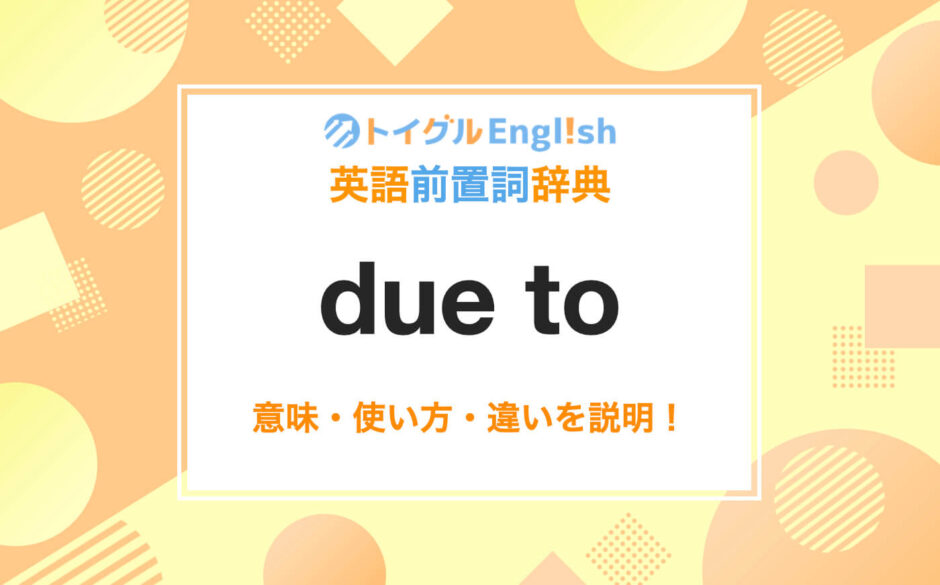英語の due to は「…のために」の意味で使われる複合前置詞です。
due to の読み方
due to
ドュゥー トゥー
/djuː/ /tə/
【due to の発音(男性声)】
【due to の発音(女性声)】
due toの使い方
1. …のためで, が原因で
- Her absence from work was due to illness.
(彼女の欠勤は病気のためでした)
due to は「…のためで」や「…が原因で」の意味で <原因> をあらわす際に使われます。
例文のように、主として、be動詞の後ろで用いられます。
due と to の間に副詞(句)を挿入できます。
- The project’s success was due in good part to teamwork.
(プロジェクトの成功は大部分, チームワークによります)
“A due to O” の形で、名詞の後に用いることもできます。
- Stress due to poor working conditions is a key factor in employee burnout.
(劣悪な労働条件によるストレスは, 従業員の燃え尽き症候群の重要な要因です)
次の例文のように、「,(コンマ)」を伴って、挿入的に用いられることもあります。
- A power failure, due to a fault in the cable, disrupted the entire neighborhood’s electricity supply.
(ケーブルの故障による停電で, 近隣全体の電力供給が途絶えました)
次の例文のように、due to the fact that(…だから)といった表現も可能です。
- The increase in sales is due to the fact that we launched a successful marketing campaign.
(売上の増加は, マーケティング・キャンペーンを成功させたことによるものです)
ただし、文字数が多く、くどい表現に聞こえるおそれがあります。以下のように because(…なので)のように、簡素な表現を使うと良いでしょう。
- Sales increased because we launched a successful marketing campaign.
(マーケティング・キャンペーンを成功させたために, 売上が上がりました)
- Her sudden weight loss was likely due to stress.
(彼女の急激な体重減少は, おそらくストレスによるものでした) - His frequent spelling mistakes were simply due to carelessness.
(彼の頻繁なつづりのミスは, 単に不注意によるものでした) - The teacher’s frustration is due to the students’ lack of attention.
(その教師のいらいらは生徒の注意散漫によるものです) - The increase in pollution levels is due to industrial emissions.
(汚染レベルの増加は, 工業排出物によるものです) - His achievements in sports are due to his dedication and hard work.
(スポーツにおける彼の功績は, 献身と努力の賜物です)
2. …のために
- Due to the rain, the outdoor event was canceled.
(雨のために, 屋外イベントは中止になりました) - Some roads were closed due to bad weather.
(悪天候のため閉鎖された道路もありました)
due to は「…のために」の意味で <理由> をあらわす際に使われます。
「1. …のためで, が原因で」は due to がbe動詞の後、あるいは名詞の後に使用されます。一方、「2. …のために」は文頭や文末の位置に用いられます。
- Due to the snow, schools were closed for the day.
(雪のために, 学校は一日休校となりました) - Prices for everyday goods have been rising steadily due to inflation.
(インフレーションのために, 日用品の価格は右肩上がりです) - The conference agenda has been updated due to the latest developments in the industry.
(業界の最新の動向を受けて, 会議の議題が更新されました) - The ferry service was temporarily suspended due to the fog.
(霧のため, フェリーの運行は一時的に中断されました) - Due to a lack of time, I couldn’t complete all the tasks on my to-do list.
(時間不足のため, やることリストの全タスクを終えられませんでした) - The company’s profitability increased due largely to cost-cutting.
(会社の収益性はコストカットのために増加しました)
due はもともと形容詞のため、「1. …のためで, が原因で」のように、be動詞の後に用いることは何ら問題ありません。
一方、due to 副詞的修飾語句として用いることについては、賛否がわかれます。
例えば、Swan は “Some people believe it is incorrect to use due to at the beginning of a clause in this way, but the structure is common in educated usage.”(このように, 句の冒頭で due to を使うのは誤りだと考える人もいるが, この構文は教育的な用法としては一般的である)として、この用法に容認的な立場です(439)。
また、Sinclair は “Some people consider that you should only use due to after ‘be’, and not in an adjunct.”(beの後にdue toを使うべきで, 接続詞では使うべきではないと考える人もいる)と述べています(p30)。
一方、Wood, Flavell&Flavell は “It is still incorrect, although quite frequent even in educated use, to use due to as a compound preposition to introduce an adverb phrase of reason.”(due toを複合前置詞として使い, 理由を表す副詞句を導入するのは, 教養のある人の使用頻度でもかなり高いが, やはり正しくない)として、否定的な見解を示しています(p99)。
Greenbaum&Whitcut は “This usage now seems thoroughly established, and is adopted by many educated speakers and writers.”(この用法は現在では完全に定着しているようで, 多くの教養ある話し手や作家が採用している)としつつ、”It still, however, arouses strong disapproval, and should be avoided by careful writers.”(しかし, それでも強い反感を買うので, 注意深い作家は避けるべきである)と述べています(p227)。
尚、学習英和辞典の多くは、「誤りと考える人が多いものの、容認されている用法」と説明しています。
3. <金銭などが> 支払われるべき
- Money is due to him for the work.
(彼の仕事に当然お金が払われるべきです)
due to は「<金銭などが> 支払われるべき」の意味で使われることがあります。
4. <尊敬などが> 払われるべき
- Thanks are due to the entire team for their hard work.
(チーム全体のハードワークに感謝が捧げられます)
due to は「<尊敬などが> 払われるべき」の意味で使われることがあります。
- It’s time for her to get the praise due to her for her years of service to the community.
(彼女の長年にわたる地域社会への貢献が称えられるべき時です)
due to と似た意味の表現に owing to があります。詳しくは別記事で紹介しているため、より詳しく知りたい方はご参照ください。

